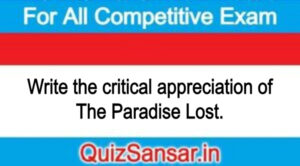
Write the critical appreciation of The Paradise Lost.
Write the critical appreciation of The Paradise Lost.
Ans.
Introduction
Milton pondered over for a long time and decided upon writing an epic. For the subject of his epic, after long choosing and beginning late, he fixed upon Paradise Lost, a design so comprehensive that it could be justified only by success. He had been driven from all public stations. He had already gone blind. It was in this situation that he started his immortal epic. Being blind, he could now neither read nor write. But he had already read and digested so much of vernacular, Latin and Greek literature. theology and scriptural literature that no more study was needed.
Theme of the Epic
The theme of Paradise Lost is the widest that has ever been attempted by man in prose or verse. The theme of this epic is Man’s fall, his redemption through Christ, and the purpose is to justify the ways to God to Man. Adam and Eve, our first progenitors, lived a blessed life in the garden of Eden in Heaven. They were given full freedom to enjoy everything that was there in Eden, except that of tasting the fruit of the tree of knowledge. Satan undertakes a journey to the new world through chaos, reaches the earth and the garden of Eden to revenge upon God by corrupting the newly created Man. He assumed the form and guise of a serpent, and tempted Eve to taste the fruit of the forbidden tree. He succeeded in seducing Eve, and Adam, despite the warning of God’s angel Raphael. tasted the fruit of the forbidden tree. This was the first act of sin, a transgression of God’s command. As a punishment for this sin, Adam and Eve were expelled from Paradise. It was a divine punishment. Suffering became the lot of Man as a result of this original sin. Satan too was punished.
Paradise Lost, A Classical Epic
This epic has all the common features of the epics of Homer and Virgil. Though it is based upon Christian theology, its framework is classical. Its design is like that of Homer’s Iliad and Virgil’s Aeneid. It is an objective narrative poem having the unity of theme and treatment. Its characters are super-human-First Man and Woman, God, Satan and Angels. The poem begins with an invocation to the Muse. Its similes are epical. It is full of descriptions of the events like other classical epics. There is in this epic an interest in the supernatural.
The Imagery used by the Poet
Milton’s imagery in this epic invokes fables of the remote world and records a composite of many experiences. Objects and persons are invested with the associations surrounding their descendants in the world of time. In the image of destruction can be heard faint rumbling from the geological dislocation of pre-history revealed by the poet. Three images are conspicuous-the comparison of Eden with pagan, of the nuptial bower with the haunts of Pan, and of Eve with Pagan goddesses.
Human Sentiments
Adam and Eve are the only two human characters. Their sentiments both of fear and repentance have, of course been beautifully and forcefully rendered. The anguish arising from the horrors attending the sense of the Divine displeasure are very justly and powerfully described. But the real greatness of Milton lies in the fact that he has rendered supernatural powers as human beings and ascribed to them human sentiments. But the central sentiment in this epic is the moral sentiment.
Characterization in the Epic
The characters in Milton’s Paradise Lost are the most sublime that human beings can conceive. They are God, Christ, the two good and evil angels, and Adam and Eve. God and Christ, the two supreme characters, are outside the range of human comprehension. The angels include Raphael and Michael. Satan is the rebel Archfiend. He revolts against God. As for human characters there are only two-Adam and Eve. The fallen angels can contract or expand at will. All of them are imperishable, immortal, and have greater powers of intuition.
Employment of Supernatural Machinery
In this epic everything is wrought through supernatural machinery. Everything is done under the immediate and visible direction of Heaven. No part of the action could have been accomplished by any other means. It contains the history of a miracle, of Creation and Redemption, and displays the power and the mercy of the Supreme Being. In Milton’s times the angels and devils of Jewish scriptures were believed to be more real beings than any historical personages could be.
Style and Language
In this epic, Milton’s style is genuinely grand. Here is a beautiful harmony between sublimity of thought and sublimity of style. His blank verse remains unsurpassed in point of eloquence, force, grandeur and sublime beauty. His use of heroic simile remains unsurpassed by any other English poet. In Paradise Lost, Milton has used all the methods for elevating his language. His metaphors are bold, just and seldom out of place. He has infused a great many foreign words in his language. He has given a great variety to his verse by suppressing a syllable in several words, and shortening those of two syllables into one. Economy and terseness are the usual features of his language. His sentences are full of substance and weight. He uses old English words or words in their original Latin sense.
- What is meant by Database Management System?
- Discuss the advantages and drawbacks of database.
- What do you mean by database ? Discuss its Characteristics.
- What is Data Mining?
- What are the conditions of communication?
- What do you mean by business communication ?
- organization / Differentiate between classical and modern theory of organization
- What is forecasting






